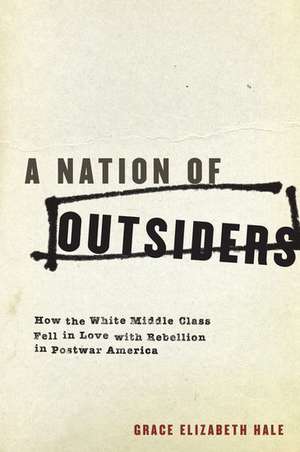A Nation of Outsiders: How the White Middle Class Fell in Love with Rebellion in Postwar America
Autor Grace Elizabeth Haleen Limba Engleză Paperback – 3 apr 2014
| Toate formatele și edițiile | Preț | Express |
|---|---|---|
| Paperback (1) | 225.90 lei 31-37 zile | |
| Oxford University Press – 3 apr 2014 | 225.90 lei 31-37 zile | |
| Hardback (1) | 158.33 lei 38-50 zile | |
| Oxford University Press – 2 feb 2011 | 158.33 lei 38-50 zile |
Preț: 225.90 lei
Preț vechi: 260.26 lei
-13% Nou
Puncte Express: 339
Preț estimativ în valută:
43.25€ • 44.48$ • 35.88£
43.25€ • 44.48$ • 35.88£
Carte tipărită la comandă
Livrare economică 07-13 februarie
Preluare comenzi: 021 569.72.76
Specificații
ISBN-13: 9780199314584
ISBN-10: 0199314586
Pagini: 404
Ilustrații: 20 illus.
Dimensiuni: 155 x 231 x 28 mm
Greutate: 0.57 kg
Editura: Oxford University Press
Colecția OUP USA
Locul publicării:New York, United States
ISBN-10: 0199314586
Pagini: 404
Ilustrații: 20 illus.
Dimensiuni: 155 x 231 x 28 mm
Greutate: 0.57 kg
Editura: Oxford University Press
Colecția OUP USA
Locul publicării:New York, United States
Recenzii
Wide ranging and engagingly written, A Nation of Outsiders is one of the most provocative works in post-World War II U.S. history published in recent years.
A Nation of Outsiders is smart, insightful, and politically astute. Grace Hale's analysis of the 'romance of the outsider' is necessary reading for anyone who has ever wondered about the meaning of our national obsession with 'authenticity'-as well as for anyone who might be curious about what Jerry Falwell and Holden Caulfield have in common.
In addition to telling a wealth of perceptively rendered stories, Grace Hale understands, as do few historians, that American rebels should neither be understood simply, with empathy, on their own terms nor viewed, often condescendingly, by the mainstream social order. No one before has woven these individual narratives into a larger analysis of how white middle-class rebels both rejected, in romantic ways, what they took to be established, oppressive norms while also helping to generate a more flexible, more profitable consumer society. In so doing, Hale makes A Nation of Outsiders required reading for anyone curious about the role and definition of rebellion in recent U.S. history.
A Nation of Outsiders provides a provocative and lively addition to the growing sense that postwar America was far less homogenous and consensual than the white bread postwar suburban stereotype suggests. Grace Elizabeth Hale carries her story forward to suggest how some of this 'rebellion' has cropped up in new and unexpected places in contemporary America. An important correction to the notion that the spirit of rebellion was limited to the 1960s or confined to those on the left.
For a nation whose history is so deeply saturated by white supremacy, Americans have paid an awful lot of attention to the disaffections of a wide array of self-proclaimed white outsiders and underdogs. Grace Elizabeth Hale provides a rich and intelligent account of how alienated-often fully aggrieved-marginality became the mainstream in post-war U.S. culture, from Holden Caulfield, the Beats, and the new minstrelsy of rock 'n' roll, to William F. Buckley and the white grievances of the Moral Majority. It's as if white Americans across the political spectrum had been rehearsing responses to the Obama presidency for two generations. This is an important book, not only for what it says about our past, but what it suggests about our present and our future as well.
A Nation of Outsiders is smart, insightful, and politically astute. Grace Hale's analysis of the 'romance of the outsider' is necessary reading for anyone who has ever wondered about the meaning of our national obsession with 'authenticity'-as well as for anyone who might be curious about what Jerry Falwell and Holden Caulfield have in common.
In addition to telling a wealth of perceptively rendered stories, Grace Hale understands, as do few historians, that American rebels should neither be understood simply, with empathy, on their own terms nor viewed, often condescendingly, by the mainstream social order. No one before has woven these individual narratives into a larger analysis of how white middle-class rebels both rejected, in romantic ways, what they took to be established, oppressive norms while also helping to generate a more flexible, more profitable consumer society. In so doing, Hale makes A Nation of Outsiders required reading for anyone curious about the role and definition of rebellion in recent U.S. history.
A Nation of Outsiders provides a provocative and lively addition to the growing sense that postwar America was far less homogenous and consensual than the white bread postwar suburban stereotype suggests. Grace Elizabeth Hale carries her story forward to suggest how some of this 'rebellion' has cropped up in new and unexpected places in contemporary America. An important correction to the notion that the spirit of rebellion was limited to the 1960s or confined to those on the left.
For a nation whose history is so deeply saturated by white supremacy, Americans have paid an awful lot of attention to the disaffections of a wide array of self-proclaimed white outsiders and underdogs. Grace Elizabeth Hale provides a rich and intelligent account of how alienated-often fully aggrieved-marginality became the mainstream in post-war U.S. culture, from Holden Caulfield, the Beats, and the new minstrelsy of rock 'n' roll, to William F. Buckley and the white grievances of the Moral Majority. It's as if white Americans across the political spectrum had been rehearsing responses to the Obama presidency for two generations. This is an important book, not only for what it says about our past, but what it suggests about our present and our future as well.
Notă biografică
Grace Elizabeth Hale is Professor of History and American Studies at the University of Virginia. She is the author of Making Whiteness: The Culture of Segregation in the South, 1890-1940.












